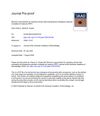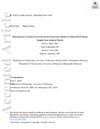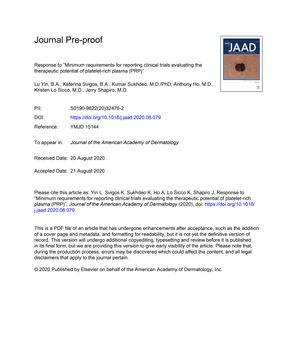TLDR The authors agree that standardizing how PRP methods are reported could help compare results, but note that the link between PRP's contents and hair growth is unclear, and recommend avoiding split-scalp designs in future trials.
The authors, Lu Yin et al., responded to Sharun & Pawde's letter regarding their paper on platelet-rich plasma (PRP) as a treatment for androgenetic alopecia. They acknowledged the variability in PRP preparations and agreed that standardized reporting of PRP methods would benefit the comparison of results across studies. However, they noted that the relationship between PRP components and hair growth outcomes is not fully understood, and current guidelines do not account for all factors that may influence hair growth. They recommended that future PRP trials for androgenetic alopecia avoid a split-scalp design due to potential diffusion of PRP, suggesting instead that patients be assigned to either a placebo or PRP group. The authors welcomed the standardization of PRP preparation reporting to improve the analysis of studies, including randomized controlled trials.
 7 citations
,
August 2020 in “Journal of The American Academy of Dermatology”
7 citations
,
August 2020 in “Journal of The American Academy of Dermatology” The document sets guidelines to standardize reporting of PRP clinical trials for better reproducibility and comparability.
 8 citations
,
August 2020 in “Experimental dermatology”
8 citations
,
August 2020 in “Experimental dermatology” PRP therapy for alopecia shows inconsistent results due to natural variability in growth factor secretion by platelets.
 33 citations
,
July 2020 in “Journal of The American Academy of Dermatology”
33 citations
,
July 2020 in “Journal of The American Academy of Dermatology” PRP treatment improves hair density and thickness for alopecia, but needs more research.
 13 citations
,
January 2020 in “Experimental Dermatology”
13 citations
,
January 2020 in “Experimental Dermatology” PRP growth factor concentrations vary, no significant hair growth difference found.
 136 citations
,
January 2013 in “International Journal of Trichology”
136 citations
,
January 2013 in “International Journal of Trichology”
 January 2019 in “Georg Thieme Verlag eBooks”
January 2019 in “Georg Thieme Verlag eBooks” Platelet-Rich Plasma (PRP) therapy can effectively treat various hair loss conditions, improve hair count, thickness, and density, and potentially speed up results when combined with surgical techniques.
1 citations
,
January 2021 in “Indian Dermatology Online Journal” PRP can help treat hair loss but needs standardized methods for best results.
 January 2026 in “Cosmetics”
January 2026 in “Cosmetics” New regenerative treatments show promise in improving hair growth for androgenetic alopecia.
May 2024 in “International journal of molecular sciences” Platelet-derived products help regenerate tissue and are used in various skin and hair treatments.
 21 citations
,
June 2019 in “Dermatologic Surgery”
21 citations
,
June 2019 in “Dermatologic Surgery” Platelet-rich plasma (PRP) treatment has been found effective in promoting hair growth for alopecia patients, with minimal side effects like temporary pain and redness.
 July 2025 in “Clinical Cosmetic and Investigational Dermatology”
July 2025 in “Clinical Cosmetic and Investigational Dermatology” PRP therapy effectively improves hair density and reduces hair loss in androgenetic alopecia.










